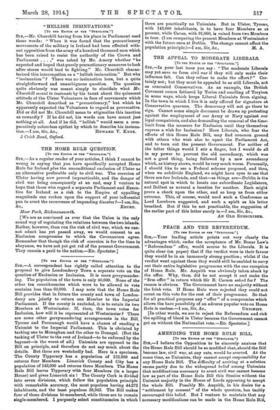[To raw Eynon or nes “Brreraros."1
Snc,—A correspondent has rightly called attention to the proposal to give Londonderry Town a separate vote on the question of Exclusion or Inclusion. It is mere gerrymander- ing. The population of the town is only 40,000. None of the other ten constituencies which were to be allowed to vote contains less than 60,000. I may note that the Home Rule Bill provides that in future the county and town of London- derry are jointly to return one Member to the Imperial Parliament. It the county is excluded, it is to retain its two Members at Westminster. If, then, the town votes for Inclusion, how will it be represented at Westminster P There are some other gerrymandering arrangements in the Bill. Tyrone and Fermanagh would have a chance of sending a Unionist to the Imperial Parliament. This is obviated by tacking one to Monaghan and the other to Donegal. (But the tacking of Ulster to the rest of Ireland—to be enforced by the bayonet—is the worst of all.) Unionists are opposed to the Bill on principle, and therefore do not say much about the details. But these are wretchedly bad. Here is a specimen. The County Tipperary has a population of 152,000 and returns four Members. Limerick County and City has a population of 143,000 and returns three Members. The Home Rule Bill leaves Tipperary with four Members (in a larger House) and gives Limerick six ! The County Cork is divided into seven divisions, which follow the population principle With remarkable accuracy, the most populous having 44,272 inhabitants, and the least populous 38,943. The Bill makes four of these divisions bi-membered, while three are to remain single-membered. I purposely select constituencies in which
there are practically no Unionists. But in Ulster, Tyrone, with 143,000 inhabitants, is to have four Members as at present, while Cavan, with 91,000, is raised from two Members to fonr. (I am comparing the present Members at Westminster with the future ones at Dublin. The change cannot affect the population principle.)—I am, Sir, &c., M. A.














































 Previous page
Previous page